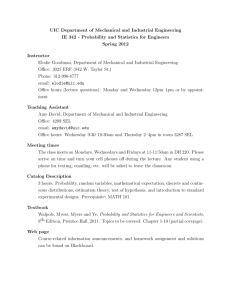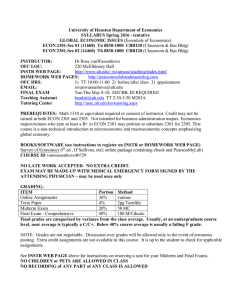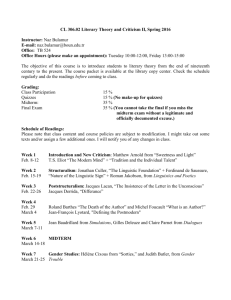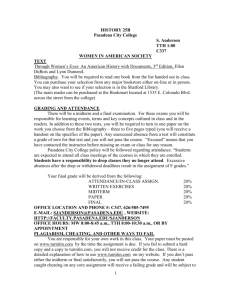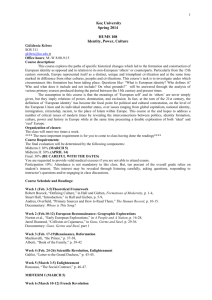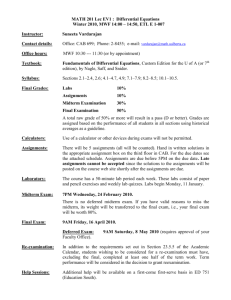Here - Alexander James
advertisement
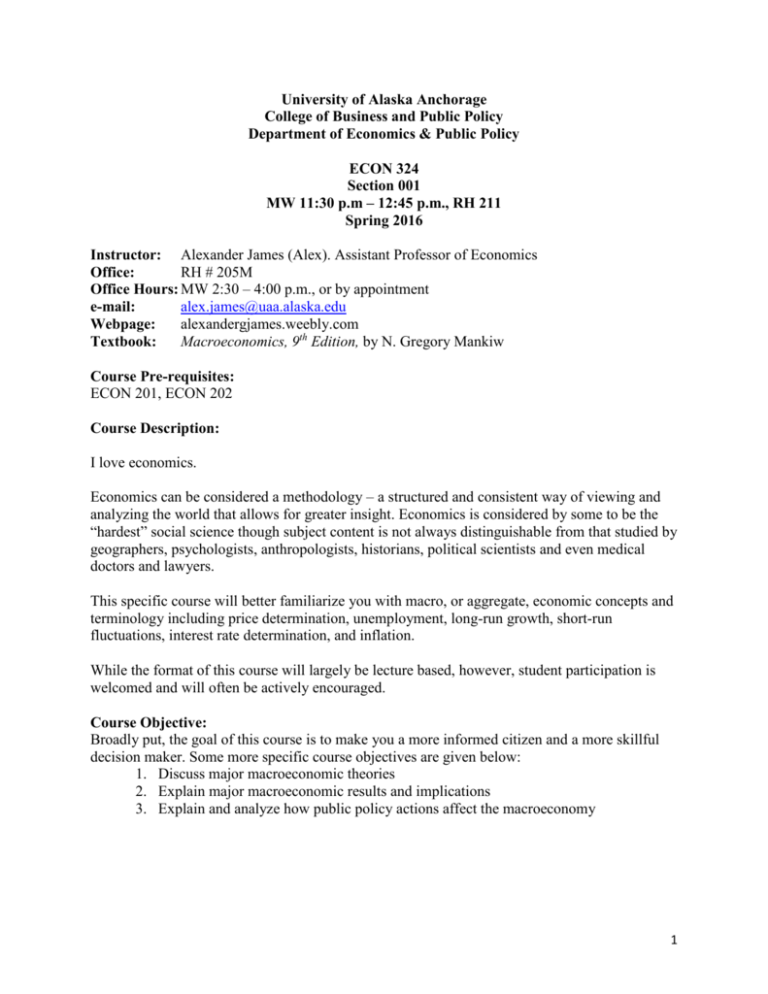
University of Alaska Anchorage College of Business and Public Policy Department of Economics & Public Policy ECON 324 Section 001 MW 11:30 p.m – 12:45 p.m., RH 211 Spring 2016 Instructor: Alexander James (Alex). Assistant Professor of Economics Office: RH # 205M Office Hours: MW 2:30 – 4:00 p.m., or by appointment e-mail: alex.james@uaa.alaska.edu Webpage: alexandergjames.weebly.com Textbook: Macroeconomics, 9th Edition, by N. Gregory Mankiw Course Pre-requisites: ECON 201, ECON 202 Course Description: I love economics. Economics can be considered a methodology – a structured and consistent way of viewing and analyzing the world that allows for greater insight. Economics is considered by some to be the “hardest” social science though subject content is not always distinguishable from that studied by geographers, psychologists, anthropologists, historians, political scientists and even medical doctors and lawyers. This specific course will better familiarize you with macro, or aggregate, economic concepts and terminology including price determination, unemployment, long-run growth, short-run fluctuations, interest rate determination, and inflation. While the format of this course will largely be lecture based, however, student participation is welcomed and will often be actively encouraged. Course Objective: Broadly put, the goal of this course is to make you a more informed citizen and a more skillful decision maker. Some more specific course objectives are given below: 1. Discuss major macroeconomic theories 2. Explain major macroeconomic results and implications 3. Explain and analyze how public policy actions affect the macroeconomy 1 Student Learning Outcomes: See also the course objective. Some additional and specific student learning outcomes include the following: 1. Compute the effect of monetary policy on the money supply and inflation. 2. Discuss major long-run growth theories and explain why some countries are poorer than others (or at least make an educated guess). 3. Discuss macroeconomic goals, activities, and outcomes of government monetary and fiscal policies. 4. Discuss factors that influence key macroeconomic variables including prices levels, employment, interest rates, and GDP. Communicating With Your Instructor Referring to me as “Alex” is fine. Email is the best way to get in contact with me. Sadly, I check my email religiously. Please be sure to provide adequate information in your email, including your name, and the very specific nature of your inquiry. The following is an example of what your emails should not look like: “hey i can’t do number 4 on the homework” Please do not ask me, in person or via email “I missed class, did I miss anything important”. It is your responsibility to obtain the information covered in classes that you miss. I will post relevant articles and announcements to blackboard. Grade Determination Midterm Exam 1: (25% of grade) Midterm Exam 2: (25% of grade) Final Exam: (25% of grade) Homework: (25% of grade) Homework. Late work is typically not accepted – but will be under extenuating circumstances. Assignments will typically be assigned every two weeks, but depends on the specific needs of the class and the speed at which material is covered. Grading Scale. The grading scale is standard. 90% - 100% A 80% - 89 % B 70% - 79% C 60% - 69% D < 60% F Grading Example: Midterm 1 = 75/100 = 75% Midterm 2 = 70/100 = 70% Final = 85/100 = 85% Homework = 60/100 = 60% Midterm 1 Midterm 2 Final Homework Total and Final Grade = (.75x.25) + (.70x.25) + (.85x.25) + (.60x.25) = 72.5% = 2 Exam policy: You are expected to take the exam on the scheduled day at the scheduled time. However, if you provide me with prior notice, exceptions can be made under extenuating circumstances. If you miss an exam and did not provide me with prior notice, a university excused absence will be required for you to make up the exam. No cellular telephones may be used during exams. Calculators are acceptable. Academic Dishonesty: As the failed anti-drug advertising campaign of the 1980’s said, “Just say no”. Academic dishonesty will not be tolerated in this course, and violators will be disciplined to the fullest extent of University Regulations. Academic dishonesty includes copying the work of any author and claiming it as your own, copying the work of another student and turning it in as your own work, allowing another student to copy your work, giving or receiving assistance without authorization on an examination, and using unauthorized electronic devices or other material during exams. Attendance Policy: If you can do well in this course without coming to class you are bright and should not be punished. However, I will not be sympathetic should you miss class and hence pertinent information. Should you come to class, please do so on time. However, as a former undergraduate, I know this is not always possible. Occasionally being late is not a problem. Leaving early, even once, is unacceptable under any circumstances unless the instructor is given prior notice. Group Work Policy You may work together on homework assignments. However, what you turn in must be your own work. This means that you cannot copy a friend's homework right before class! I will know if this is the case. If I determine that you have copied another student's work, you and the person you copied from will receive a zero on the assignment. Depending on the infraction, other disciplinary actions may be considered (see policy regarding academic dishonesty). I consider cheating/copying a serious offense. I do not expect any students to be found guilty of this. Classroom Behavior & Courtesy Your obligations in the classroom include acting in a mature manner that is conducive to enhancing the learning atmosphere. Disruptive behavior includes but is not limited to: talking while someone else is talking, neglecting to turn one’s cell phone on silent or leaving early without prior notification. Do not use offensive language, disparaging names, or belittle any person in this course. Every person in this class is deserving of respect and you are expected to act accordingly. 3 Expected Course Outline: Week 1 2 3 4 5 6 7 8 9 10 11 12 13 14 15 Month Mon/Wed Chapter Concepts Jan 11/13 1 Macro Fundamentals Jan 18/20 2 Measuring Macro Variables Jan 25/27 3 National Income Feb 1/3 4 The Monetary System Feb 8/10 NA Midterm 1 Feb 15/17 5 Inflation Feb 22/24 7 Unemployment & Labor Market Feb 29/Mar 2 8 Long Run Growth I Mar 7/9 9 Long Run Growth II Mar Mar Mar Apr Apr Apr 14/16 21/23 28/30 4/6 11/12 18/20 NA NA 10 11 12 14/15 Spring Break Midterm 2 Short Run Fluctuations IS-LM I IS-LM II Application TBD (Ch 14, 19, or buffer). 16 Apr 25/27 NA Final Exam All of the above is subject to change No Class Jan 18th No Class This Week Friday, Apr 29. 10:00 – 12:45. 4

